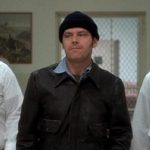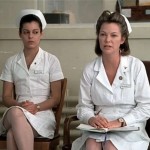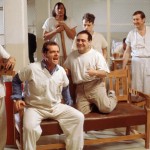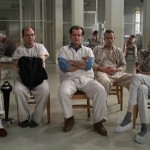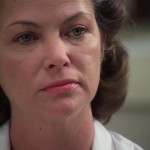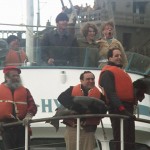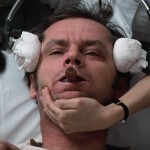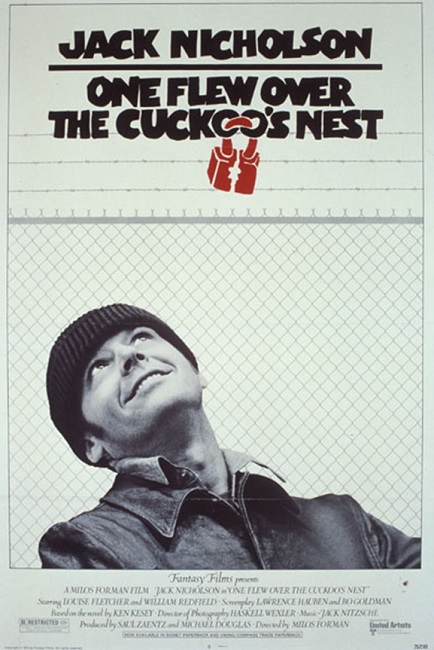
One Flew Over the Cuckoo’s Nest – 1975
This was an incredibly good movie. It was a drama that was dramatic on multiple levels. The casting and the acting were both phenomenal. The directing was first rate. The sets and costumes were perfect.
Interesting note, this movie was filmed at the very hospital in which the fictional story took place. With the permission of the hospital, the inmates, and in some cases, their families, real patients were used as background extras. The doctors at the hospital considered the filming experience to be good therapy for them.
The movie starred Jack Nicholson as Randall Patrick “Mac” McMurphy, a man with serious and sometimes violent mental instability. Opposite him is Nurse Ratched, played by Louise Fletcher. Her flawless performance in this film was nothing short of genius. She knocked this one out of the park.
Those two actors were beyond fantastic, but they were surrounded by a supporting cast that really knew their craft. William Redfield, Will Sampson, Brad Dourif, Sydney Lassick, Danny DeVito, and Christopher Lloyd all did a terrific job. Each character was a complex individual, every personality distinct and memorable.
In this way, the plot demanded a lot from each of the actors. There was an intensity and a realism to each of them that was captivating to watch. The plot focuses on McMurphy, a criminal sent to a mental institution from a penitentiary for the purpose of evaluation for mental stability. While there, he meets the inmates.
Redfield plays Dale Harding: High-strung, well-educated, and paranoid. Sampson plays “Chief” Bromden: a mountain of a man who is believed to be a deaf mute. Dourif plays Billy Bibbit: Intense stuttering with a history of suicide attempts. Lassick plays Charlie Cheswick: a man prone to uncontrollable fits of childish behavior. DeVito plays Martini: a man who is delusional and who often loses touch with reality. And finally, Lloyd plays Max Taber: a man who is uncontrollably belligerent and profane.
Interesting note: Brad Dourif, the youngest inmate, did such a good job, he was nominated for Best Supporting Actor. He was 24 when filming took place.
Presiding over the ward with a practiced calm voice, a serene smile, and an iron fist is Nurse Ratched. She is a professional nurse who believes completely in what she does and the methods she employs to do it. She exudes self-righteousness and the desire to control. But working with crazy people every day can take a toll on a person if she does not maintain a professional and emotional distance from them. The problem with this attitude is that she takes the notion to the extreme, excising all emotion from herself when dealing the patients, including the most important emotion for a nurse to have: compassion.
She feels no compassion or sympathy for them at all. This translates into plain and simple cruelty at times. She treats them as things, almost possessions sometimes, not people. And she does it all in the name of trying to help them.
But when McMurphy arrives at the institution, he throws her carefully ordered life into turmoil. He actually befriends the inmates and wrests control from her, something that in her mind is utterly unacceptable. There is a constant battle fought between them for control of the ward.
Even though McMurphy obviously has anger issues and complete disregard for any authority figure, as a viewer, you instantly form an attachment to him. He seems to be a light that has been brought into the darkness of the lives of the inmates who are suddenly being treated like human beings. Mac goes out of his way to convince them that they are not crazy. And he is so persuasive that they start to believe him.
Nicholson was perfect for the part. You can see it in his eyes, his smile, his movements. The crazy was there the whole time, but contained and controlled, for the most part. He was so convincing that even now, I wonder how much of his performance was acting, and how much was simply drawn from his own personality.
His antics were sometimes close to comical, though I found very little humor in the film. The way he treated the inmates with respect, the way he interacted with them, and the way he always found a way to do what he wanted to do was inspiring to watch. When he did something that might be considered amusing, he brought a rare kind of infectious joy to the men of the ward that overshadowed the comedy. Nicholson was incredible.
And then there was Louise Fletcher. She was amazing with her cold and calculating eyes, her calm demeanor, her perfect, clean, white uniform, her flawless hair. When she feels her control slipping away, her fury can be seen boiling like magma beneath the surface of her placid face. She was frightening and mesmerizing at the same time.
Both Nicholson and Fletcher won Academy awards for Best Actor and Best Actress, respectively. They were so real, so believable. Of course, much of this has to do with the script, written by Laurence Hauben and Bo Goldman, and the director, Milos Forman
But one of the supporting actors whom I feel did an incredible job, though I feel he was under-recognized for his performance, was Sidney Lassick. As Mr. Cheswick, he was incredible, over the top, and yet completely human and believable. The character had the mind of a young child trapped in the body of an adult. Mentally and emotionally, I would guess he was around 4 years old. Lassick was incredible. His behavior was so appropriately infantile.
One scene in particular caught my attention. Nurse Ratched had confiscated all the cigarettes on the ward because Mac had won them all by gambling with the inmates. Cheswick wanted his cigarettes and basically threw the fantastic tantrum of a toddler who was not getting his way. A fight ensued involving Mac, Chief Bromden, Cheswick, and the ward’s guards. The three inmates are taken away for shock treatment. Shock therapy, in the film, was almost depicted as a punishment or deterrent. When it was Cheswick’s turn, he was terrified, believing he had done nothing wrong. The guards grabbed him and he started screaming and crying like a frightened child as he was forcibly dragged into the room. I was nearly in tears, myself, as he was carried away.
In the end, it was Mac’s love for his newfound and unexpected “family” that he’d created at the hospital that was his undoing. Without going too far into the details of the ending, I can say that because he treated the inmates like human beings, they all began to love him. Even the deaf mute, who, it turned out, was neither deaf nor mute, grew to love him, thinking of him as a kind of father figure. Without intending to, McMurphy had created these feeling in the inmates who had so desperately needed such a relationship.
The tragedy of the ending was heart wrenching and poignant. Nurse Ratched did something so cruel and heartless that he lost control of himself and attacked her, nearly chocking her to death. For this, he was given a frontal lobotomy in an effort to put an end to his violent behavior. But under such circumstances, even if I could not condone his act of murderous rage, I could very easily understand it.
As disturbed as he was, McMurphy was a bright light that was never meant to burn forever, and when it was gone it was clear that its brief presence had been enough to leave a profound mark on the lives it touched.
This script was so well written and the acting was so good, that this, to me, stands out as one of the best dramas ever written for the silver screen. It effortlessly drew me into the world of the insane asylum and made me feel for the poor souls living within its walls.
Interesting note: This film was the second to win “the big five” at the Academy Awards – Best Picture, Best Director, Best Screenplay, Best Actor and Best Actress. The first had been It Happened One Night in 1934. Though the film was nominated for 9 awards, these were the only 5 it won.
